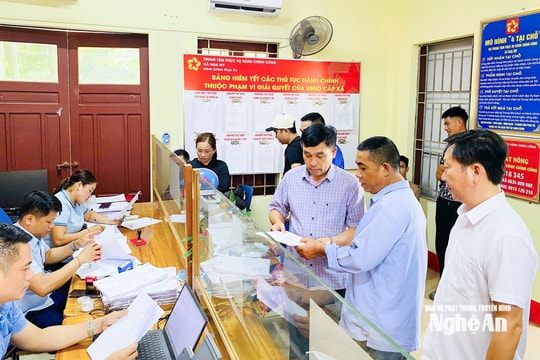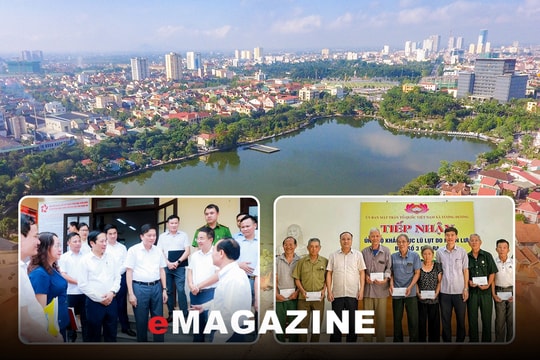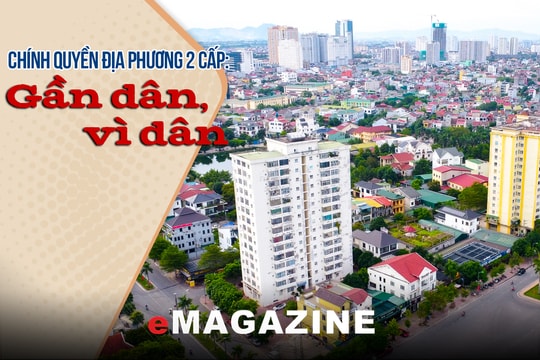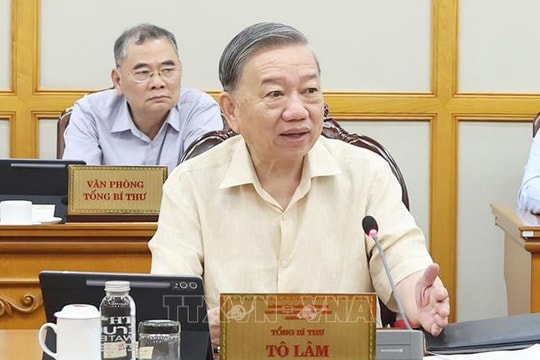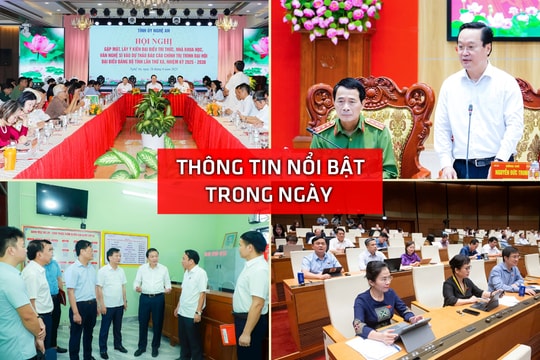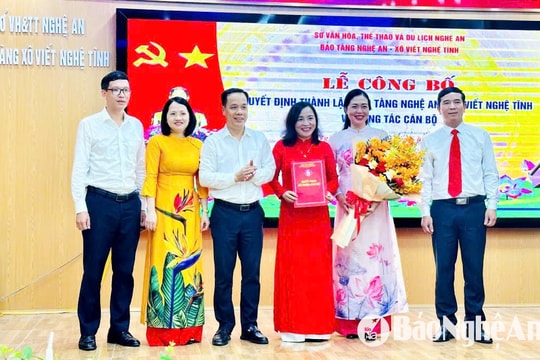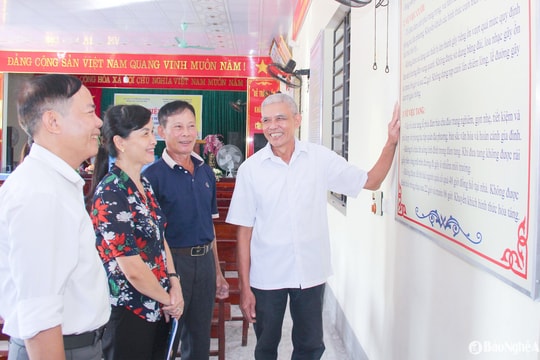'Revolution' to streamline the apparatus: There must be sacrifices
If streamlining the apparatus is considered a revolution, to successfully carry out that revolution, there must certainly be sacrifice and great determination.
The problem of the political system's apparatus becoming increasingly bloated and operating inefficiently is an urgent requirement to continue innovating and reorganizing the political system's apparatus.
Regarding this content, VOV reporter interviewed Associate Professor, Dr. Nguyen Quoc Dung - Member of the Central Theoretical Council, Director of the Regional Political Academy IV, Ho Chi Minh National Academy of Politics.
 |
| Associate Professor, Dr. Nguyen Quoc Dung |
PV:Over the past years, our Party has issued and regularly paid attention to leading and directing the implementation of many policies, resolutions and conclusions on building the political system's organizational apparatus, but up to now, the political system's organizational apparatus is still cumbersome, multi-layered, ineffective and inefficient; and its activities are still overlapping. In your opinion, what is the reason?
Associate Professor, Dr. Nguyen Quoc Dung:The theme of the 6th Central Conference itself shows its urgency. For the following reasons:
Besides certain achievements in the innovation of the Party's leadership methods, it can be said that the current apparatus of our Party is still operating ineffectively. This is reflected in the overlapping and dispersion of power, the fact that there are too many directing agencies and there are jobs that have no one directing them, and no one is responsible.
Second, we need to streamline the apparatus which is in danger of becoming increasingly bloated and solve the problems within the apparatus. This bloat is putting a lot of pressure on the budget. 70% of the current budget is focused on regular spending, only 30% is invested in development which is very low. The problem is how to streamline the apparatus, reduce the number of people working in this apparatus. Only then can we consider increasing salaries. Currently, we have talked about increasing salaries in the apparatus many times but the implementation is still very unstable.
PV: So, in your opinion, how do we need to streamline and merge the apparatus to operate effectively?
Associate Professor, Dr. Nguyen Quoc Dung:Our budget is currently shouldering three apparatuses: the State apparatus, the Party apparatus, and the mass organizations and socio-political organizations. We must reorganize by merging the departments with the same functions together. For example, the Central Inspection Committee can merge with the Government Inspectorate; the Central Organizing Committee can merge with the Ministry of Home Affairs; the Ministry of Planning and Investment can be attached to the Ministry of Finance...
To build a streamlined political system that operates effectively and efficiently, I think we must innovate from the top, from the central government and ministries first, instead of starting from the grassroots as has been done for a long time. In reforming the organizational apparatus, streamlining from the top will be the destination, the direction for the lower levels to implement, first of all from the Party apparatus.
I see that there are agencies that can merge or dissolve, abolish intermediate levels in the process of performing tasks. For example, the 3 Steering Committees (SC) of the Northwest, Central Highlands and Southwest can be completely reformed and dissolved. In those regions, there only needs to be a coordinating agency of the Government to advise the Government on policies to connect activities to link regions, but there is no need for a SC, because in reality, the SCs do not work effectively.
Or the Party Committees from the Central to the provincial and municipal levels, the Party Committees of the business sector, the agency sector, the Civil Party sector, and the Party Committees of the private enterprise sector are also intermediate levels. Without this organization, the Party's activities would still exist and develop. I think that such intermediate bodies should not exist when we reform the apparatus.
PV:It can be said that the major obstacle to the streamlining of the Party, State and organizations that has been implemented over the years is the impact on the power and interests of many people. What do you think about this assessment?
Associate Professor, Dr. Nguyen Quoc Dung:The innovation of the Party's leadership method, especially the building of a streamlined political system that operates effectively and efficiently, is a very important and not simple task, affecting the interests and rights of many people. As former General Secretary Le Kha Phieu said, this must be considered a revolution within the apparatus. The revolution within the apparatus is understood as a comprehensive and thorough innovation, eliminating the old and backward things. Since it is a revolution, there must certainly be sacrifices and great determination to be able to do it.
Reforming the political system in a streamlined manner, improving the effectiveness and efficiency of the Party's leadership method is a task that needs to be done immediately, firmly and in the long term. This is also a big problem that needs to be solved with love and reason because it affects the status and interests of each individual.
PVAlong with reforming and streamlining the apparatus, it is necessary to improve the management capacity of the leadership team and the professional qualifications of civil servants and workers?
Associate Professor, Dr. Nguyen Quoc Dung:The reform of the political apparatus towards streamlining will be the premise, the important condition to attract talent. The simple reason is that only by streamlining the apparatus can the State raise salaries. This is also one of the less attractive points of the State agency compared to the outside agency. People cannot live, work and develop their talents in difficult and tight salary conditions.
In addition, the agencies of the political system must create a fair environment to select workers and let them contribute. The positions need to be recruited through exams. Currently, the Ministry of Home Affairs and some other places have done so. I propose to organize exams at the head level, not at the deputy level.
PV:To avoid overlap in the activities of the political system and enhance the role and responsibility of the leader, the issue of unifying the positional apparatus between the Party and the State was also mentioned at this Central Conference. What is your opinion on this issue?
Associate Professor, Dr. Nguyen Quoc Dung:In practice, in recent times we have unified a number of titles, and reality has proven that such unification is completely correct.
For example, the Secretary holds the position of Chairman of a locality; the head of a State unit must be the Party Secretary of that agency. With such unification, one person does the work of two people, power will be more concentrated and the tasks of the Party and State will be well performed.
Along with the unification of positions between the Party and the State, the role of heads of units, agencies and localities must be strengthened. When assigned responsibilities, local heads must be responsible for all activities of their units and localities and are given certain powers to carry out their tasks.
Once the responsibility of the unit head has been unified and enhanced, it is necessary to perfect the construction of a rule-of-law state through legal mechanisms and social criticism mechanisms to be able to monitor the unit head. We can absolutely do this. Those who do the right thing will be honored, and those who do the wrong thing will be punished by law. There must be a balance between responsibility and benefits.
In particular, through the mechanisms of tenure, legal mechanisms, and policies of social organizations and people's supervision, I think we have the conditions to control the abuse of power by unit leaders.
PV:Thank you, sir./.
According to VOV
| RELATED NEWS |
|---|

